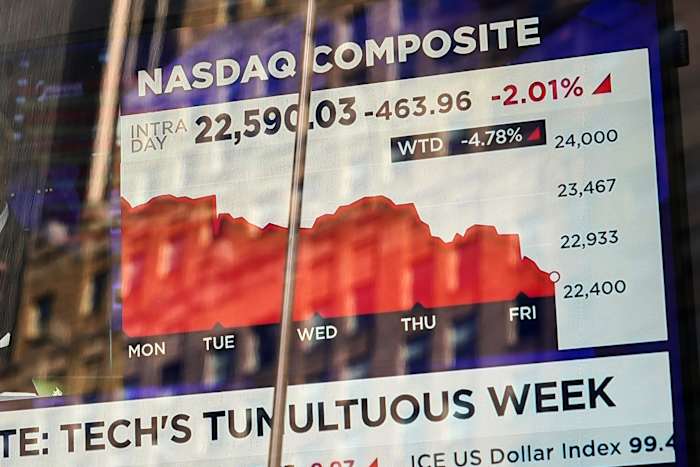**Asian Shares Mostly Lower as Tech Rally Loses Momentum**
*BANGKOK* — Asian shares were mostly lower on Tuesday as the recent rebound fueled by buying of technology shares lost steam. Markets showed little reaction to the latest step toward ending the U.S. government shutdown, after the Senate passed legislation to reopen the government. U.S. futures were little changed, while oil prices slipped.
Shares have been bouncing on criticism that tech share prices have soared too high due to the mania for artificial intelligence (AI), which some have likened to the 2000 dot-com bubble that ultimately burst.
In Tokyo, the Nikkei 225 lost 0.5% to close at 50,675.92. The U.S. dollar climbed slightly to 154.15 against the Japanese yen from 154.14 yen, near its highest level since February. Expectations that the government will push back its schedule for trimming Japan’s massive national debt and boost spending have contributed to weakening the yen. Meanwhile, the euro inched up to $1.1563 from $1.1557.
Chinese shares also declined on Tuesday. Hong Kong’s benchmark Hang Seng index fell 0.2% to 26,595.97, and the Shanghai Composite index dropped 0.4% to 4,002.06. South Korea’s Kospi, recovering from last week’s fall below the 4,000 level, initially rose more than 1% but finished up 0.4% at 4,087.56. Australia’s S&P/ASX 200 dropped 0.2% to 8,818.80, Taiwan’s Taiex fell 0.3%, and India’s Sensex shed 0.4%.
On Monday, Big Tech and other key players of the U.S. stock market returned to rallying, with Wall Street recovering most of last week’s losses. The S&P 500 climbed 1.5% to 6,832.43, while the Dow Jones Industrial Average rose 0.8% to 47,368.63. The Nasdaq composite rallied 2.3% to 23,527.17.
Leading the gains was Nvidia, which surged 5.8%. The powerful rebound came after Nvidia and other winners of the AI frenzy had led last week’s market drop. Critics argue that AI-related stocks had climbed too high, too fast, drawing comparisons to the 2000 dot-com bubble.
Declines in several health insurers tempered the market’s gains. These firms fell as uncertainty remains over whether Washington will extend expiring health care tax credits—an ongoing sticking point on Capitol Hill that has contributed to the longest-ever U.S. government shutdown.
Elsewhere on Wall Street, Berkshire Hathaway slipped 0.4% after CEO Warren Buffett cautioned shareholders that many other companies are likely to outperform Berkshire in the years ahead due to its massive size. Buffett, 95, is set to step down in January.
Tyson Foods climbed 2.3% after the seller of chicken, beef, and pork reported stronger-than-expected profits for its latest quarter. According to FactSet, roughly four out of every five companies in the S&P 500 that have reported so far this summer have beaten analysts’ profit expectations.
While companies typically beat estimates each quarter, pressure was particularly high this time as they needed to justify the substantial upward moves in their stock prices since April. Delivering bigger profits remains one of the more straightforward methods to silence criticism that stock prices have become overvalued.
In commodities trading Tuesday morning, U.S. benchmark crude oil fell 25 cents to $59.88 per barrel. Brent crude, the international standard, also shed 25 cents to $63.81 per barrel.
—
*AP Business Writers Stan Choe and Matt Ott contributed to this report.*
https://www.clickorlando.com/business/2025/11/11/asian-shares-are-mostly-lower-despite-wall-st-rally-and-a-potential-end-to-the-us-shutdown/
